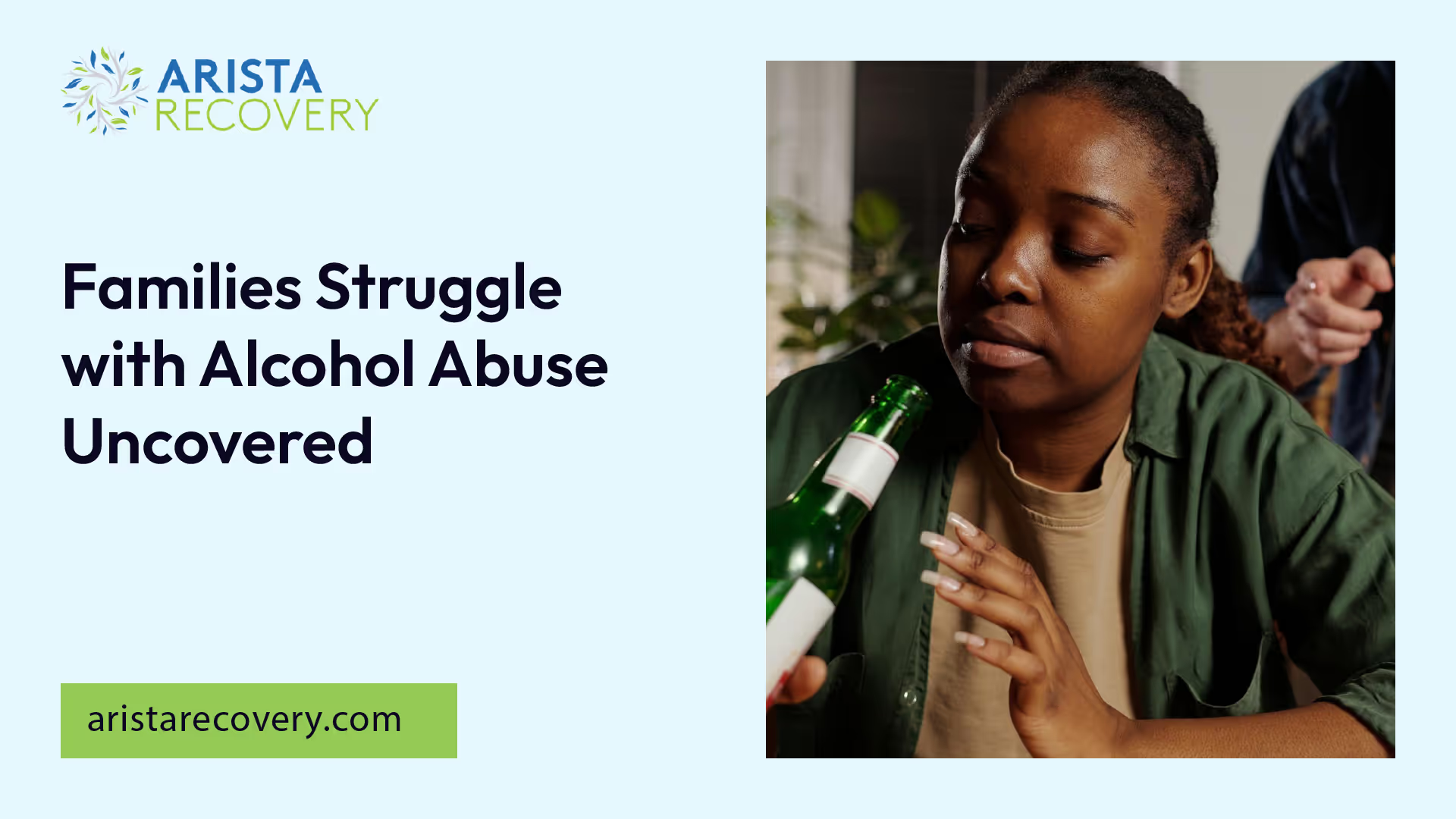
Families Struggle with Alcohol Abuse Uncovered

Effects on Children and Families
Impact of Parental Alcohol Misuse
When a family member misuses alcohol, it can create significant challenges for the entire family unit. Children are particularly vulnerable in these situations. In the U.S., approximately 11 million children under the age of 18 live with at least one alcoholic parent. This exposure often leads to chaotic home environments characterized by uncertainty, arguments, and even violence, which can have lasting effects on a child's development [1].
The impact of parental alcohol misuse can manifest in various ways. Households where alcohol is misused often experience a range of problems, including:
FactorEffectArguments and TensionChildren witness fighting, which can lead to feelings of fear and insecurity.Disrupted RoutinesPredictable family life may be altered, complicating a child's ability to thrive.NeglectBasic needs of children may be overlooked due to parental focus on alcohol consumption.
Research indicates that between one-third and two-thirds of child maltreatment cases involve some degree of substance use, highlighting the connection between parental substance use disorders (SUDs) and child well-being.
Emotional Toll on Children
The emotional toll on children living in households with alcohol misuse is profound. Exposure to a parent's alcohol misuse is linked to various psychological issues, such as anxiety, depression, and low self-esteem [3]. Children often feel helpless in these environments, leading to long-term emotional and behavioral challenges.
Common emotional effects on children include:
Emotional ResponseDescriptionAnxietyFear of unpredictable behavior from a parent can lead to chronic anxiety.DepressionProlonged exposure to domestic turbulence may result in feelings of sadness or hopelessness.Trust IssuesChildren may struggle to form healthy relationships due to insecurity and fear of abandonment.
It is crucial for families suffering from alcohol abuse to seek support and resources. Family members are in a unique position to notice changes in behavior and mood, and they can connect loved ones with treatment options and support services, promoting the possibility of recovery and a healthier family dynamic [4].
Effects on Spouses and Partners
The struggles with alcohol misuse extend beyond the individual suffering from addiction. Spouses and partners of those who misuse alcohol often face their own set of challenges and emotional fallout.
Emotional Repercussions
Spouses or partners frequently experience a wide range of negative emotions when dealing with a loved one's alcohol abuse. Feelings of fear, hurt, shame, and a sense of failure are common. This emotional toll can lead to serious repercussions, including feelings of abandonment, unworthiness, guilt, and self-blame. These emotions can foster a codependent relationship, where the partner becomes overly involved in managing the drinker's behavior and the related problems.
The instability introduced by alcohol misuse can also manifest financially, as spouses may feel they are part of a financial unit. This may lead to financial challenges, increased debt, and instability within the home. The Centers for Disease Control and Prevention estimates that binge drinking leads to $249 billion in annual healthcare-related costs and decreased employee productivity.
Common Emotional RepercussionsImpactFearConstant anxiety about the partner's behaviorShameFeeling embarrassed about the situationGuiltSelf-blame for perceived shortcomingsAbandonmentFeeling neglected or emotionally distantFinancial strainIncreased debt and instability
Coping Mechanisms
In navigating the difficulties associated with living with a partner who misuses alcohol, individuals often develop various coping mechanisms. Some may choose to take on additional responsibilities within the household to compensate for the drinker's negligence. This can include managing finances, caring for children, or handling household chores. However, this often leads to further distress as the seated issues remain unaddressed.
Other coping mechanisms may involve avoiding confrontation with the partner or hiding the severity of the problem from others. This secrecy is often rooted in feelings of shame and can perpetuate the cycle of dependency and neglect.
It is crucial for spouses to seek support and pursue helpful strategies to maintain their wellbeing. Family therapy can provide a structured environment to address these challenges. Family therapy for alcohol use disorder is aimed at making interpersonal, intrapersonal, and environmental changes within the family, which can offer relief and foster a healthier dynamic.
Recognizing these emotional repercussions and coping methods is essential for spouses and partners affected by alcohol misuse, as they too deserve support and understanding in such challenging circumstances.
Intergenerational Cycle
The cycle of alcohol misuse often extends beyond the initial abuser, affecting future generations in significant ways. The repercussions can create a lasting impact on children, influencing their behaviors and life choices.
Risk of Alcohol Misuse in Offspring
Children raised by parents who misuse alcohol are at a markedly higher risk of developing similar issues. Research shows that these children are four times more likely to misuse alcohol themselves [5]. The combination of genetic predispositions and environmental influences contributes to this increased likelihood.
Risk FactorLikelihood of MisuseOffspring of Alcohol Misusers4 times greaterOffspring of Non-UsersBaseline risk
This elevated risk is partially attributed to genetic factors related to addiction as well as the normalization of unhealthy drinking habits within the household. Furthermore, children exposed to parental alcohol misuse often develop maladaptive coping strategies, which can lead to substance use in their adult lives.
Challenges Faced by Adult Children
The challenges faced by adult children of individuals who misused alcohol are numerous and complex. These individuals are four times more likely to choose partners who also struggle with Substance Use Disorders (SUD) and have a heightened risk of developing their own addiction issues. Additionally, they commonly experience:
These factors can perpetuate the cycle of substance misuse within families, making recovery and healing especially challenging. Understanding these risks and experiences is crucial in addressing the broader impact of alcohol misuse on families and their long-term recovery journeys.
Family Therapy and Support
In dealing with the challenges of addiction, particularly alcohol misuse, family therapy plays a pivotal role. Families suffer from alcohol abuse not just because of the individual misusing substances, but also through the ripple effects it creates within the family unit.
Importance of Family Involvement
Family involvement is crucial in addressing issues related to alcohol misuse. When one family member struggles with alcohol abuse, it increases the risk of other family members developing substance use issues [5]. Engaging family members in the treatment process can help prevent the spread of substance misuse within the family, creating a more supportive and understanding environment.
Family members are often in a unique position to observe changes in behavior and mood. Their insights can facilitate connections to appropriate treatment resources and services. Providing a strong support system through family involvement can significantly enhance treatment effectiveness, according to SAMHSA.
Benefits of Family InvolvementDescriptionEnhanced CommunicationEncourages open dialogue about feelings and experiences related to substance use.Supportive EnvironmentCreates a safer and more supportive atmosphere for recovery.Improved Treatment SuccessIncreases the likelihood of successful recovery outcomes when family is involved.
Role of Family Therapy
Family therapy for alcohol use disorder focuses on making interpersonal, intrapersonal, and environmental changes within the family. The goal is to help both the individual misusing alcohol and the family members who are affected by this behavior.
Family therapy addresses the dynamics that contribute to the problem, allowing families to explore issues that influence the misuse of alcohol. This therapeutic approach can prevent the recurrence of alcoholism or other substance misuse disorders in the family.
Key Components of Family TherapyDescriptionStructured SessionsProvides a safe space for family members to communicate openly.Exploration of Underlying IssuesHelps identify and address issues leading to substance misuse.Development of Coping StrategiesEquips family members with skills to support their loved one through recovery.
In summary, family involvement and therapy are essential components in the recovery process from alcohol misuse. These elements can enhance treatment outcomes and promote a healthier family environment. By addressing the needs and dynamics of the whole family, it becomes possible to create lasting solutions to alcohol abuse issues.
Domestic Violence and Abuse
Link to Substance Misuse
Substance misuse, particularly alcohol abuse, is closely linked to domestic violence. Research indicates that a significant majority of domestic violence incidents involve the use of alcohol or other drugs. Specifically, 92% of victims of domestic violence reported that the assailant had used alcohol or drugs on the day of the assault. Furthermore, studies show that between 60 to 70% of individuals who engage in partner violence had misused alcohol [5].
The impact of alcohol misuse does not only place individuals in immediate danger; it can also contribute to long-term cycles of violence and relationship dysfunction. Alcohol can impair judgment and reduce inhibitions, leading to aggressive behavior. Consequently, families suffer from alcohol abuse as it perpetuates a harmful environment where violence may become normalized.
StatisticPercentageAssaults where alcohol or drugs were involved92%Individuals attacking a partner who misused alcohol60-70%
Addressing Co-Occurring Issues
Addressing the co-occurring issues arising from domestic violence and alcohol misuse is crucial for long-term recovery and healing within families. Alcohol misuse often leads to profound problems in marriages, including financial instability, emotional distress, and feelings of abandonment, unworthiness, and guilt [5].
Effective treatment must involve not just the individual struggling with substance abuse but also the entire family. Family therapy can play a pivotal role in mitigating these issues. By involving all members of the family in alcoholism treatment, therapeutic interventions can instigate lifestyle changes that help prevent the recurrence of substance misuse among family members. This approach reduces the potential for substance use problems to spread from one family member to another, fostering a healthier family dynamic and promoting recovery.
By recognizing the link between substance misuse and domestic violence, families can seek appropriate interventions that address both issues simultaneously, paving the way for a path towards healing and recovery.
Seeking Help and Support
Addressing the challenges faced by families suffering from alcohol abuse begins with recognizing the problem and understanding the importance of seeking treatment.
Recognizing the Problem
Many individuals with alcohol use disorder may hesitate to seek help because they do not recognize their drinking as problematic. Family members often play a crucial role in identifying changes in mood or behavior, making them well-positioned to recognize issues related to alcohol misuse. Common signs that indicate someone may be misusing alcohol include:
If family members are concerned about someone’s drinking, they should consider consulting a professional experienced in alcohol treatment for guidance on approaching the person.
Importance of Seeking Treatment
Seeking treatment is vital for overcoming alcohol abuse and restoring family stability. Alcohol misuse can lead to various issues within the family unit, including financial instability and emotional distress, manifesting as feelings of abandonment, guilt, and unworthiness. Addressing these issues through professional help can significantly improve family dynamics.
Families should understand the resources available to them, including the SAMHSA National Helpline at 1-800-662-HELP (4357), which provides assistance for mental or substance use disorders. Engaging in a professional intervention may also help individuals recognize the need for treatment and encourage them to accept help from supportive loved ones.
By recognizing the problem and seeking appropriate treatment, families can begin the journey towards recovery and healing from the effects of alcohol misuse.
References
[2]:
[3]:
[4]:
[5]:
[6]:
When mental health challenges and addiction intersect, it can feel isolating. At Arista, we offer compassionate, evidence-based, and trauma-informed care to help you heal, grow, and move forward.
You’re not alone in this.
When mental health challenges and addiction intersect, it can feel isolating. At Arista, we offer compassionate, evidence-based, and trauma-informed care to help you heal, grow, and move forward.
Support that moves with you.
You’ve taken a brave first step. At Arista Recovery, we’re here to help you continue with best-in-class care designed for long-term healing and support.
.webp)






